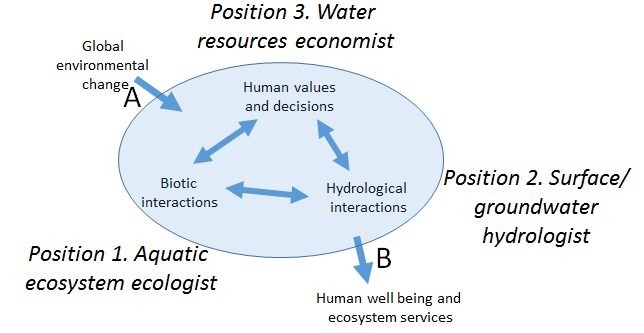Interdisciplinary Cluster in Freshwater Sustainability
Cluster Hire Initiative
We are happy to welcome three exciting new water scientists to the Water@UW-Madison community thanks to the recent Freshwater Sustainability Cluster Hire. The cluster included positions for a freshwater ecologist, a hydrologist, and a water resources economist. Together, these scientists will explore new dimensions in water research, enhancing UW-Madison’s role as a global leader in addressing emerging water sustainability issues. Connections made across disciplines, through the hydrological, biological, and social sciences have great potential to yield insights into the dynamics of complex natural systems, providing a foundation for science-based decision making and more effective water management strategies. Water@UW-Madison would like to extend a very warm welcome to each of these phenomenal scientists; we can’t wait to hear more from them!

Grace Wilkinson
Grace Wilkinson is a Freshwater Ecologist. Grace’s lab uses a combination of whole-ecosystem experiments, comparative surveys, long-term data, and high-frequency observations to understand patterns and drivers of lake dynamics.

Athena Nghiem
Athena Nghiem is a chemical hydrologist. Athena will officially join us in Fall of 2024, when she will begin her work investigating the redistribution of contaminants and trace elements and their exchange between different reservoirs under anthropogenic and climatic impacts.
Rhiannon Jerch
Rhiannon Jerch is an economist. She uses applied methods in microeconomics to understand the relationship between urban growth dynamics, public goods provision, and environmental regulation.
Each faculty member will have a disciplinary home department, as well as an option for a joint appointment in the Nelson Institute for Environmental Studies. As shown in Figure 1, the cluster’s combined expertise in hydrological, biological, and social sciences will position the group to dig deeply into the solutions to wicked water management problems.
Figure 1. How the Three Faculty Positions of the Cluster Hire Relate

Cluster Hire Background
The cluster hire emerged from the collective interests and deliberation of the 100+ faculty and other researchers of the Water@UW-Madison community. The organization’s executive committee solicited input from Water@UW-Madison members on areas of faculty expertise that are: (i) under-represented at UW-Madison; (ii) most likely to complement existing expertise on multidisciplinary projects; (iii) poised to increase UW-Madison’s external funding competitiveness; and (iv) at the forefront of innovative multidisciplinary approaches for addressing critical state and national water problems.
The “wicked water problems” we hope to shed some light on are water-related problems that require interdisciplinary collaboration, integration of different types of knowledge, and working across several units of analysis. More generally, wicked problems are those that involve complex natural systems spilling across traditional scientific disciplinary boundaries, and interacting with similarly complex social systems to frustrate solutions. An example is the allocation of limited freshwater resources amongst agricultural uses, ecosystems, and municipalities that rely on the same water source. While inherently a resource limitation problem from the scientific standpoint, actual solutions require coordination with existing policies, stakeholder engagement and acceptance, and consideration of how human actors may adapt to changes in policy or resource allocation. Many of the water problems facing society can be traced to trade-offs in the quantity and quality of water available to each of these entities.
Click here for information about the Office of the Provost Cluster Hire Initiative
